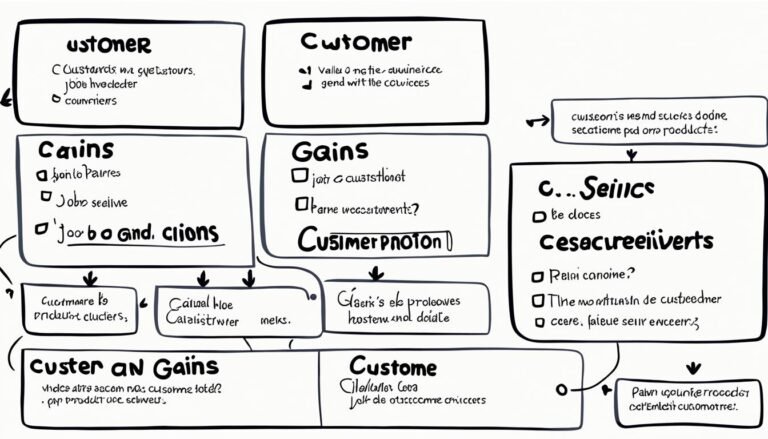Mastering Negotiation Psychology in Sales Techniques
Preparing for a negotiation can be daunting, but with the right mindset and techniques, it can lead to success. By understanding negotiation psychology in sales, salespeople can enhance their deal-closing skills and improve their overall performance.
Key Takeaways:
- Sales negotiation strategies play a crucial role in closing deals effectively.
- The psychology of persuasion in sales can influence buyer behavior and lead to successful negotiations.
- Effective negotiation techniques involve understanding cognitive biases and leveraging them to your advantage.
- Persuasive selling techniques and emotional intelligence are key components of negotiation success.
- By mastering negotiation skills, salespeople can achieve mutually beneficial outcomes and build long-term partnerships.
Eliminate Anxiety for Successful Negotiation
Anxiety can greatly impact the outcome of negotiations, causing salespeople to feel overwhelmed and less confident. To ensure successful negotiation, it is crucial to eliminate negative thinking and overcome anxiety. By implementing effective strategies, sales professionals can build their confidence and approach negotiations with a positive mindset.
Preparation: The Key to Overcoming Anxiety
Negotiation preparation plays a vital role in reducing anxiety. By thoroughly researching and understanding the negotiation context, salespeople can gain valuable insights that boost their confidence. Adequate preparation helps sales professionals anticipate potential challenges and develop effective strategies to address them, easing anxiety and promoting a sense of control.
Start Small to Build Confidence
Building confidence in negotiation is a gradual process. Salespeople can begin by seeking out smaller negotiation opportunities to gain experience and build their confidence. Each successful negotiation reinforces their belief in their abilities, eroding anxiety and paving the way for more complex negotiations.
- Identify low-stakes negotiation scenarios.
- Set achievable goals for each negotiation.
- Celebrate small wins to boost confidence.
Positive Thinking: The Salesperson’s Mindset
Positive thinking plays a crucial role in overcoming anxiety in negotiation. By adopting a positive mindset, salespeople can shift their focus from potential failures to positive outcomes. This shift in perspective helps alleviate anxiety and facilitates clearer thinking and better decision-making during negotiations.
“I’ve learned that fear limits you and your vision. It serves as blinders to what may be just a few steps down the road for you. The journey is valuable, but believing in your talents, your abilities, and your self-worth can empower you to walk down an even brighter path.”
Visualization Techniques for Building Confidence
Visualization is a powerful tool to overcome anxiety and build confidence in negotiations. By mentally rehearsing successful negotiation scenarios, salespeople can program their minds to feel more confident and familiar with the negotiation process. Visualization instills a sense of preparedness and reduces anxiety by creating a psychological sense of familiarity and control.
Embrace Positive Affirmations
Positive affirmations are simple statements that salespeople can repeat to themselves to enhance confidence and reduce anxiety. By affirming their negotiation skills and positive outcomes, salespeople can shift their mindset and overcome self-doubt. Some examples of positive affirmations include:
- “I am well-prepared and capable of negotiating successfully.”
- “I approach negotiations with confidence and a positive mindset.”
- “I am deserving of a fair and mutually beneficial outcome.”
By eliminating anxiety, building confidence, and embracing a positive mindset, salespeople can approach negotiations with clarity and focus. Overcoming anxiety sets the stage for successful negotiation outcomes and strengthens professional relationships with clients.
Harness the Power of Listening
Active listening is a crucial skill for effective negotiation. By focusing on understanding the customer’s needs and building rapport, salespeople can greatly enhance their chances of success. In fact, listening twice as much as speaking can provide valuable insights and create a positive psychological environment that sets them apart from competitors.
To truly harness the power of listening, salespeople should employ active listening skills. This involves not only hearing the customer’s words but also paying attention to their tone, body language, and emotions. By doing so, salespeople can gain a deeper understanding of what the customer truly needs and desires.
Building Rapport through Active Listening
“To effectively build rapport and establish trust with customers, active listening is key. It shows that we genuinely care about their needs, and it allows us to uncover valuable information that can help us tailor our offerings to their specific requirements.” – Emily Johnson, Sales Manager at ABC Inc.
One effective technique is to repeat back what the customer says in your own words. This not only shows that you’re actively listening but also clarifies any potential misunderstandings. Additionally, seeking agreement throughout the conversation helps create a collaborative and respectful atmosphere, fostering the customer’s trust and willingness to engage in the negotiation process.
By taking the time to listen and understand, salespeople can tailor their approach to meet the customer’s specific needs, increasing the likelihood of a successful negotiation. This level of attentiveness and empathy establishes a solid foundation for building rapport, which is essential for long-term customer relationships and repeat business.
The Power of Understanding Customer Needs
Understanding the customer’s needs is an essential aspect of successful negotiation. When salespeople actively listen and gain insights into the customer’s challenges, pain points, and desires, they can position their offerings as the ideal solution. This understanding allows salespeople to tailor their proposals to address the unique needs of each customer, making their offerings stand out from competitors.
Moreover, effective listening helps salespeople uncover any underlying motivations or values important to the customer. By aligning their approach with these key drivers, salespeople can create a strong emotional connection, strengthening the customer’s trust and engagement in the negotiation process.
The Benefits of Effective Listening in Sales Negotiation
- Gain valuable insights into customer needs and motivations
- Build rapport and establish a positive psychological environment
- Tailor proposals to address specific customer requirements
- Create a strong emotional connection with customers
- Stand out from competitors by understanding and meeting customer needs
By actively listening and employing effective listening techniques, salespeople can navigate negotiations with confidence, empathy, and understanding. This approach not only increases the likelihood of achieving win-win outcomes but also lays the foundation for long-term customer relationships built on trust and mutual benefit.
Adopt a Partner Approach
When it comes to sales negotiations, viewing potential customers as partners rather than opponents can be a game-changer. By adopting a partner approach, salespeople can foster confidence, trust, and establish a collaborative mindset that can lead to win-win outcomes. This approach involves understanding that both parties have common interests and working together to create mutually beneficial solutions.
Collaborative negotiation is based on the belief that the best deals are achieved when both parties feel satisfied and valued. Instead of trying to outwit or overpower the other side, salespeople focus on building rapport, understanding the needs of the customer, and seeking common ground. This approach sets a positive psychological tone and creates a conducive environment for constructive dialogue.
One way to foster collaboration is by involving customers in the decision-making process. By seeking their input and involving them in the negotiation, salespeople can make customers feel like valued partners. This can lead to a stronger commitment to the agreed terms and a longer-lasting business relationship.
Collaboration is the key to creating a win-win situation in sales negotiation. By treating customers as partners and working together towards a common goal, salespeople can build trust, achieve favorable outcomes, and create long-term value.
In some cases, an agreement may seem unlikely or negotiations may reach an impasse. In such situations, sales professionals can consider the strategy of removing the offer. This technique provokes a reevaluation from the customer and enhances the perception of value. It can create a sense of urgency and encourage the customer to reconsider their position, leading to a breakthrough in the negotiation.
Adopting a partner approach in sales negotiation not only increases the likelihood of successful outcomes but also strengthens the overall relationship with the customer. It sets salespeople apart from competitors and establishes a reputation for fairness and collaboration, which can attract new customers and boost customer loyalty.
Table
| Benefits of a Partner Approach in Sales Negotiation |
|---|
| Enhanced trust and rapport |
| Increased customer commitment |
| Potential for win-win outcomes |
| Long-term business relationships |
| Competitive advantage through collaboration |
Gain Clarity through Empathy
When it comes to sales negotiation, gaining a clear understanding of the customer’s perspective is vital for success. By putting themselves in the customer’s shoes, salespeople can gain valuable insights into their demands, strengths, and weaknesses. This empathetic approach allows salespeople to form a psychological connection with the customer, building trust and facilitating better communication.
Understanding the customer’s perspective provides salespeople with clarity and enables them to navigate negotiations more effectively. With this insight, salespeople can tailor their approach and offer solutions that align with the customer’s specific needs and desires. By truly understanding what the customer wants and values, salespeople can position themselves as trusted advisors and increase the likelihood of reaching a mutually beneficial agreement.
Building trust through empathy not only enhances the negotiation process but also cultivates long-term relationships. Customers appreciate salespeople who genuinely understand their concerns and priorities. By demonstrating empathy, salespeople can create a positive experience for the customer, leading to greater customer satisfaction and increased loyalty in the long run.
“Empathy is about finding echoes of another person in yourself.” – Mohsin Hamid
Embracing empathy in sales negotiation requires active listening, asking thoughtful questions, and displaying genuine care for the customer’s needs and concerns. By adopting an empathetic approach, salespeople can foster deeper connections, build trust, and ultimately increase their chances of negotiation success.
Prioritize Building Relationships
Building trust and relationships is a fundamental aspect of successful negotiations and sales. In order to establish strong connections with customers and achieve positive outcomes, salespeople must focus on understanding their pain points, empathizing with their needs, and providing solutions to their problems.
Genuine empathy is a key factor in building trust with customers. By putting ourselves in their shoes, we can gain a deeper understanding of their challenges and pain points. This allows us to offer tailored solutions that address their specific needs and build rapport.
“Empathy is about understanding the emotion behind the decision-making process. It’s not just about listening to what the customer says, but also understanding why they are saying it.”
When salespeople actively listen to customers and demonstrate empathy, it creates a positive psychological environment that fosters trust. Customers are more likely to open up and share important information, enabling salespeople to better navigate the negotiation process.
Understanding Pain Points
To effectively build relationships, salespeople must have a deep understanding of their customers’ pain points. By identifying and addressing these pain points, salespeople can position themselves as valuable problem-solvers.
- Research and gather information about the customer’s industry, challenges, and competitors.
- Identify common pain points experienced by customers in similar industries or situations.
- Ask targeted questions to uncover specific pain points relevant to the customer.
By demonstrating an understanding of their pain points, salespeople can build credibility and trust, positioning themselves as trusted advisors who can provide effective solutions.
Showing Empathy
Empathy is the ability to connect with customers on an emotional level and understand their perspective. It involves actively listening, acknowledging their feelings, and responding with compassion. By showing empathy, salespeople can create a sense of partnership and trust.
Here are some ways to show empathy during sales negotiations:
- Validate the customer’s concerns and emotions by acknowledging them.
- Use open-ended questions to encourage customers to share their thoughts and feelings.
- Reflect and paraphrase the customer’s statements to show that you understand their perspective.
By prioritizing relationship building, trust, and customer empathy in sales negotiations, salespeople can establish long-term partnerships based on mutual understanding and collaboration. This not only leads to successful negotiations but also lays the foundation for continued business growth and customer satisfaction.
Focus on People, Not Numbers
A customer-centric approach is crucial in negotiations. Instead of criticizing or pushing customers too hard, salespeople should create an environment of fairness and work towards mutually beneficial outcomes. By focusing on meeting customer needs and creating value, salespeople can achieve successful negotiations.
Customer-Centric Negotiation
In a customer-centric negotiation, the focus is on understanding and meeting the customer’s needs. By placing the customer at the center of the negotiation process, salespeople can establish trust, build rapport, and create a win-win scenario. This approach allows for a more collaborative and productive negotiation that aims to satisfy both parties.
Fairness in Negotiation
Fairness is a fundamental principle in negotiation. By adopting a fair and equitable mindset, salespeople can foster trust and goodwill with customers. Fairness involves treating all parties involved with respect, integrity, and transparency. When customers perceive fairness in the negotiation process, it enhances their satisfaction and increases the likelihood of a successful outcome.
Meeting Customer Needs
Understanding and addressing customer needs is key to successful negotiations. By actively listening to customers, salespeople can gain valuable insights and tailor their proposals accordingly. Meeting customer needs involves identifying pain points, offering suitable solutions, and providing exceptional customer service. This customer-centric approach not only enhances the negotiation process but also strengthens long-term customer relationships.
Mutual Benefits
Negotiations should aim for mutual benefits, where both the salesperson and the customer gain value from the agreement. By focusing on creating win-win outcomes, salespeople can develop collaborative relationships with customers. This approach ensures that both parties are satisfied with the negotiation results and helps build a foundation for future cooperation.
In the words of business mogul Richard Branson, “In business, as in life, all parties should ideally end up happy.” By focusing on the people involved and prioritizing fairness, customer-centric negotiation can lead to successful outcomes that benefit all parties involved.
| Benefits of Customer-Centric Negotiation: |
|---|
| 1. Establishes trust and rapport |
| 2. Increases customer satisfaction |
| 3. Strengthens long-term relationships |
| 4. Creates win-win outcomes |
Remember, focus on the people in the negotiation room, not just the numbers on the table. By adopting a customer-centric approach, prioritizing fairness, meeting customer needs, and aiming for mutual benefits, salespeople can achieve successful negotiations that lead to long-term business success.

Utilize Framing and Anchoring Techniques
In the art of negotiation, framing and anchoring techniques are powerful tools that can significantly influence the outcome of a deal. By employing these strategies, salespeople can shape customer expectations, establish a reference point, and increase the likelihood of a favorable agreement.
Framing in negotiation involves presenting the product’s benefits and value in a way that highlights its unique qualities and aligns with the customer’s needs. It’s about positioning the offering in a positive light, showcasing its strengths, and emphasizing how it addresses the customer’s pain points. By using persuasive language and compelling storytelling, salespeople can frame the product as the ideal solution.
Anchoring pricing strategy is another effective technique that sets the tone for the negotiation. It involves strategically presenting the initial price as a reference point or anchor. This anchor serves as a psychological benchmark for the customer and influences their perception of value and acceptable price ranges. By carefully setting the anchor to align with the product’s worth, salespeople can shape the customer’s mindset and guide the negotiation towards a desired outcome.
Let’s take a look at an example to illustrate the power of framing and anchoring:
Imagine you are a salesperson who is selling a luxury watch. Instead of simply stating the features and price, you could frame the product as a symbol of success and sophistication. By highlighting its craftsmanship, exclusivity, and timeless elegance, you create a desire in the customer’s mind.
Next, you anchor the pricing strategy by initially quoting a higher price, perhaps in line with similar luxury brands. This establishes a reference point that positions your offering as premium. Then, you proceed to present a more reasonable but still profitable price, making it appear like a significant discount compared to the initial anchor.
This framing and anchoring technique shapes customer expectations, making the final price more appealing and increasing the likelihood of closing the deal. However, it’s essential to strike a balance between creating a positive perception and being transparent, ensuring that the customer feels they are receiving fair value.
Employing negotiation tactics involving framing and anchoring requires empathy, active listening, and a deep understanding of the customer’s needs and motivations. These techniques should complement a customer-centric approach, where the salesperson focuses on building trust, delivering value, and ensuring a mutually beneficial outcome.
Your negotiation skills can be further enhanced by effectively handling objections and paying attention to non-verbal cues, which we will discuss in the upcoming sections.
| Framing and Anchoring Techniques | Benefits |
|---|---|
| Shapes customer expectations | Guides the negotiation towards a desired outcome |
| Positions the product in a positive light | Increases perceived value and desirability |
| Establishes a reference point | Influences the customer’s perception of value and acceptable price ranges |
| Creates a favorable environment for negotiation | Increases the likelihood of closing the deal |
Handle Objections Effectively
Objections are a common occurrence during negotiations, but they shouldn’t be seen as obstacles. In fact, objections present valuable opportunities for salespeople to address customer concerns and find solutions. By understanding the psychology behind objections and being prepared with effective answers, salespeople can turn objections into stepping stones towards a successful negotiation outcome.
Addressing objections confidently is key to instilling customer confidence in the offering. Salespeople should listen attentively to the concerns raised by customers and empathize with their perspective. By doing so, they can tailor their responses to meet the customer’s specific needs, thereby overcoming any doubts the customer may have.
“Objections are not rejections, they are requests for more information.”
Objections are typically raised due to a lack of understanding, skepticism, or fear. Instead of simply dismissing objections, salespeople should view them as an opportunity to educate the customer and provide additional information that addresses their concerns. By taking a consultative approach and providing relevant details, salespeople can alleviate doubts and build trust with customers.
Effective objection handling techniques involve active listening, thoughtful responses, and persuasive communication. Salespeople should respond with confidence and use persuasive strategies to validate their offerings and address customer objections. By doing so, they can reinforce the value proposition and overcome any doubts that customers may have.
To handle objections effectively, salespeople should:
- Listen actively and understand the customer’s concerns.
- Empathize and acknowledge the customer’s viewpoint.
- Offer personalized solutions that address the specific objection raised.
- Provide supporting evidence or testimonials to build credibility.
- Anticipate objections in advance and proactively address them during the negotiation process.
By following these objection handling techniques, salespeople can navigate negotiations smoothly and increase the likelihood of closing deals successfully. Remember, objections are not roadblocks, but opportunities to build rapport, address concerns, and ultimately, achieve mutually beneficial outcomes.
| Objection | Effective Response |
|---|---|
| “Your product is too expensive.” | Highlight the value and unique features that justify the pricing. Offer a comparison with competitors to show the superior advantages of your product. |
| “I need more time to think.” | Reassure the customer that taking the time to make an informed decision is crucial. Offer to provide additional information or answer any further questions they may have. |
| “I’m not sure if your product can deliver what I need.” | Provide case studies, customer testimonials, or product demonstrations that demonstrate the product’s capability to meet their specific needs. |
| “I’ve had a bad experience with similar products in the past.” | Empathize with the customer’s previous experience and acknowledge their concerns. Highlight how your product addresses the pain points that led to their bad experience. |
By mastering the art of objection handling, salespeople can establish themselves as trusted advisors in the negotiation process. Addressing objections effectively not only increases the chances of closing deals but also strengthens the customer’s trust and confidence in the salesperson and the offered solution.
Pay Attention to Non-Verbal Cues
When it comes to negotiations, non-verbal communication speaks volumes. The way you carry yourself and express yourself through body language can have a significant impact on the outcome of a negotiation. By paying attention to these non-verbal cues, you can build rapport, convey assertiveness, and establish trust with the other party.
Body Language in Sales
Body language plays a crucial role in sales negotiations. It includes gestures, facial expressions, posture, and even the tone of voice. By understanding and controlling your body language, you can create a positive impression and effectively convey your message.
Here are some key non-verbal cues to keep in mind:
Conclusion
Mastering negotiation psychology in sales is the key to achieving success in sales negotiations. By utilizing effective techniques such as eliminating anxiety, practicing active listening, adopting a partner approach, and prioritizing relationship-building, salespeople can enhance their deal-closing skills and achieve favorable outcomes. The ability to approach negotiations with empathy, adaptability, and a focus on trust and rapport-building is essential.
By continuously practicing and deepening their understanding of negotiation psychology, sales professionals can become true masters of the art of persuasion. It is through this mastery that they will be able to navigate negotiations with confidence and finesse, consistently closing deals and achieving their goals.
Remember, negotiation is not just about numbers and figures; it is about understanding and connecting with people. By applying effective negotiation strategies and techniques, salespeople can create win-win situations for both themselves and their customers, fostering long-term partnerships based on trust and mutual benefits. So, keep practicing, honing your skills, and embracing the power of negotiation psychology to unlock new levels of success in your sales career.
Source Links
- https://www.entrepreneur.com/growing-a-business/7-psychological-strategies-for-mastering-sales-negotiations/239382
- https://joshfelber.com/mastering-the-art-of-negotiations-and-sales-psychology/
- https://www.rurallifestyledealer.com/articles/6049-psychological-strategies-for-mastering-sales-negotiations







